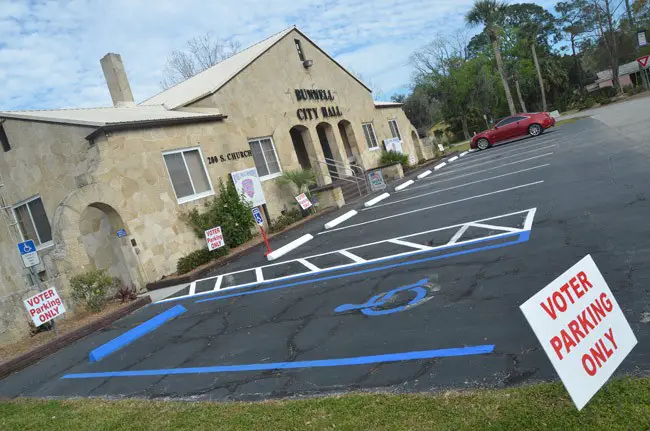
A measure is moving swiftly through the state Legislature that would change the schedule of city elections for some 260 municipalities across Florida, including Bunnell and Flagler Beach.
Bunnell city commissioners Monday night spoke strongly in opposition to the measure, and directed the city administration to send emails and a letter to state senators outlining their objections. It’s not clear whether the opposition will be effective, being quite late: the Florida House already passed the proposal. Flagler Beach appears uninterested in the issue: the item does not appear on its very brief Feb. 25 agenda.
“We didn’t get the heads up that this bill was even moving until it had already passed the house,” Wade Vose, the Bunnell city attorney, said. “There are four, five state representatives in there that voted for it that I bet you I could have bent at least two of their ears and changed their minds. Preemption bills like this where the Legislature is trying to take away cities’ home rule powers, they’re very popular up there, usually arises when some bad thing happens to one constituent somewhere in the state, and then all of a sudden they get the idea let’s stop all cities from doing anything like this ever again.”
The proposal would force those cities to hold elections concurrent with other primaries and general elections–that is, in even-numbered years–or to follow a prescribed approach in odd-numbered years. The idea is to save taxpayer money and improve turnout, two demonstrably certain results of the proposed approach.
But the proposal would also undermine home rule–the principle that local governments know how best to administer their own affairs. It would not, however, force cities such as Bunnell and Flagler Beach to alter the three-year terms for their elected officials.
For example this year, when Bunnell and Flagler Beach were to hold elections anyway, they would have been required to hold them concurrently with the Aug. 30 primary and the November 8 general election, rather than in March, as the cities usually do. As it is, Flagler Beach will not have an election because the two seats were filled without a contest. Three candidates are running for two seats in Bunnell’s election, which is still being held in March, but concurrently with the March 15 presidential preference primary. If the proposed measure had been law, Bunnell would still have been required to hold its election in August, and again in November if a run-off was necessary.
When Bunnell next has an election, in an odd-numbered year, the measure calls for it to hold its initial election roughly 10 weeks before the first Tuesday in November, and its runoff on the first Tuesday in November (assuming a Monday in November precedes it).
Too many ballot choices would result in “ballot fatigue,” Bunnell claims.
The measure passed the House on Feb. 3 by a 70-47 vote, with Paul Renner, the Republican who represents all of Flagler County, voting with the majority. The Florida League of Cities, which opposes the proposal, sent a legislative alert to its member cities, asking them to oppose the bill, and suggesting that the Senate Ethics and Elections Committee could be introducing a companion bill as early as Feb. 16. It did not do so, nor is such a bill on the committee’s agenda for today’s 1:30 p.m. meeting. (Vose told the city commission that the Senate version had cleared at least one committee so far.)
Monday evening, Dan Davis, the Bunnell city manager, and Vose, openly advocated against the proposal. “I plan on reaching out to every single one of them, expressing my concerns,” Davis said, addressing the city commission even before commissioners themselves had made clear that they were opposed to the bill. Davis had cited “voter fatigue” as one of the reasons to oppose the measure: if voters are faced with too-long ballots, they may give up filling them out, and city issues would get neglected.
He acknowledged, however, that cities would save money if elections were held alongside general elections. Currently, Bunnell and Flagler Beach must pay the supervisor of elections to hold elections on their own. But, as is the case this March, Bunnell will not have to pay anything, as it will get to piggy-back onto the primary election.
Palm Coast opted to change its election schedules to make it concurrent with general elections in even years several years ago, recognizing the savings and the benefits in turn-out. It was proven correct on both counts. While Bunnell City Commissioner Elbert Tucker, who said he loves statistics, said there was no evidence to back up the claim that turnout would benefit, Palm Coast’s experience says otherwise.
The last time Palm Coast held an election in an off, or odd, year, was in 2011. Turnout was dismal: fewer than 5,500 people voted, for a turnout of 11.6 percent that November. Fewer still had voted in the mayoral election earlier that year, with a turnout of 10.6 percent and barely 5,000 people voting. In sharp contrast, when Palm Coast held its municipal election in 2014, concurrently with the general election, the primary drew out double the turnout, with 12,500 voters casting ballots, and the general drew a 52 percent turnout, with 24,200 ballots cast. It was by far Palm Coast’s most successful election, by turnout–and its least expensive.

Nor would the city be required to change any part of its charter. As a legislative analysis of the bill summarizes the content of the bill itself, “The bill does not require a municipality to alter or amend its charter. Any municipal charter provision that conflicts with the bill is automatically superseded without further action by the municipality. Likewise, any ordinance that conflicts with the bill is automatically superseded without any further action of the municipality. If all municipalities in a county and the SOE agree to conduct elections for municipal officers within the county on one alternative fixed date, the bill requires each municipality in the county to adopt an ordinance to adopt the date, provide dates for qualifying, and establish the date on which the elected officers’ terms of office commence. However, if the municipalities within a county and the SOE do not agree on one alternative fixed date for elections of municipal officers, the bill does not require the municipalities to take any action.”
Curiously, if anyone gains more authority in the bargain, it isn’t the state but the local supervisor of elections.
Still, Bunnell commissioners were opposed. “It’s awful funny how they say, this is what we want to do,” Commissioner John Rogers, who chaired Monday’s meeting in the absence of Mayor Catherine Robinson, said. “We need to let them know we’re opposed to it.”
![]()
Click to access elections-schedules.pdf





























Common Sense says
I don’t think Municipal elections should be on the state and federal election ballot either. It clutters the ballot, causes confusion and may be over whelming to some voters-not to mention the attention needs to be focused on one election at a time by the elections division. All municipalities should hold their elections at one time to share the expense, but not along with state and federal elections.